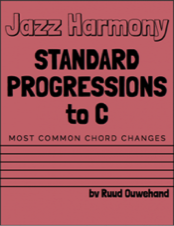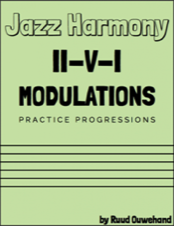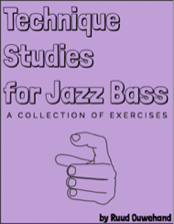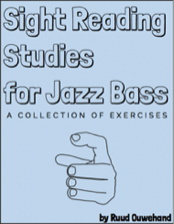When I hear music on radio, television, in the movies – anywhere, I want to analyze it. It's all about the ears!
Meet Dutch jazz bassist and educator Ruud Ouwehand
Meet Dutch jazz bassist and educator Ruud Ouwehand
Ruud Ouwehand had this urge since he was a young child. He learned how to play by ear out of curiosity. And that undoubtedly played a big role in becoming who he is today – a sought after musician and educator with teaching positions at the conservatories of Amsterdam (NL), Enschede (NL) and Bremen (Germany).
Growing up in a musical household, Ruud was constantly singing and playing guitar or piano. He was learning songs by listening over and over again on the family tape recorder. Genres didn’t matter – classical, jazz, pop, traditional folk music, even jingles – he was soaking up music like a sponge.
Later, Ruud did the same with his brother’s Gypsy Swing and jazz guitar records – playing guitar along with Django Reinhardt, Wes Montgomery and the early George Benson. When the bass player in his brother’s band quit, Ruud took over, first on bass guitar and eventually, at age 16, on upright bass. He continued to learn the same way: “Playing along with recordings of Joe Pass, Jim Hall, Freddy Green in the Count Basie Band, Ray Brown and Oscar Peterson was my only hobby in those days – no written music, only ears.”
After studying at the Hilversum Conservatory with some of the Netherlands’ best jazz musicians and gaining recognition for performances in clubs, on live radio and in the studio, Ruud was offered a teaching position at his alma mater for upright bass and ear training, which is were I had the pleasure to be one of his students.
Growing up in a musical household, Ruud was constantly singing and playing guitar or piano. He was learning songs by listening over and over again on the family tape recorder. Genres didn’t matter – classical, jazz, pop, traditional folk music, even jingles – he was soaking up music like a sponge.
Later, Ruud did the same with his brother’s Gypsy Swing and jazz guitar records – playing guitar along with Django Reinhardt, Wes Montgomery and the early George Benson. When the bass player in his brother’s band quit, Ruud took over, first on bass guitar and eventually, at age 16, on upright bass. He continued to learn the same way: “Playing along with recordings of Joe Pass, Jim Hall, Freddy Green in the Count Basie Band, Ray Brown and Oscar Peterson was my only hobby in those days – no written music, only ears.”
After studying at the Hilversum Conservatory with some of the Netherlands’ best jazz musicians and gaining recognition for performances in clubs, on live radio and in the studio, Ruud was offered a teaching position at his alma mater for upright bass and ear training, which is were I had the pleasure to be one of his students.
Teaching how to play by ear
Showing his students how to play by ear is the most important mission in Ruud Ouwehand’s teaching. He plays piano in his bass lessons, knows many jazz standards and works with his students on becoming adept at playing standards and chord progressions in all keys.
Harmonic context is key, not looking at a chord in isolation: “What is important is where it is coming from and where it is going.” For Ruud voice leading is crucial when playing walking bass, melodies or solos. “Jim Hall called it ‘the inner voice’”.
Regarding playing in challenging keys he says: “The audience doesn’t care how difficult a key is, they want to hear good music. You should practice difficult keys until they sound as good as the ‘easy’ keys.”
Here’s a list of exercises that Ruud’s students work on regularly during lessons:
Harmonic context is key, not looking at a chord in isolation: “What is important is where it is coming from and where it is going.” For Ruud voice leading is crucial when playing walking bass, melodies or solos. “Jim Hall called it ‘the inner voice’”.
Regarding playing in challenging keys he says: “The audience doesn’t care how difficult a key is, they want to hear good music. You should practice difficult keys until they sound as good as the ‘easy’ keys.”
Here’s a list of exercises that Ruud’s students work on regularly during lessons:
- play jazz standards in all keys: bass lines, heads (melodies), solos
- modulate in the middle of a song (e.g. play the last A section a half step higher or lower or in a completely different key)
- start the melody of a standard on a random note (without thinking about the key first)
- play a bebop head an octave higher (on upright bass that means a completely different fingering)
- play along with known and unknown recordings
- “write along” with recordings
- play along with music in other genres (including country songs, kids’ songs, Oom-pah or hurdy-gurdy music, often with I-IV-V harmonies)
- find the logic in chord progressions (add or skip chords)
- compose original chord progressions
- quickly memorize songs
- change time signatures in the middle of a song
Practice tools
- An old-fashioned metronome (pendulum) with a bell on ‘1’. “You can see when the click will come just like you can see when a drummer is about to hit the cymbal.”
- Odd Metronome , an iOS app. Ruud uses it with a hi-hat sound on 2 and 4.
- Drumgenius , an iOS and Android app playing drum loops with adjustable tempos
- iReal Pro , an app that simulates a rhythm section with programmable chord progressions. In ‘practice mode’ it can be set to modulate after every repeat. Great for practicing in all keys.
The results
Some of the tasks in Ruud’s lessons can be challenging for students initially. But working through them always seems to pay off. Here is what some of his former students have to say:
He was ‘sticking his finger in my ‘musical wounds’ to later cure them. I will be thankful for him my whole life.
Jonathan Ihlenfeld Cuñiado (Trilok Gurtu, PC Energetic)
Singing your own telephone number! That was one of Ruud’s exercises.
Phaedra Kwant (Voted best jazz/fusion bassist Benelux 2016 by readers of ‘De Gitarist’ magazine)
Everything solid I know about bass playing comes from him. Ruud’s soul is in my bass playing. Far the best teacher I ever had!
Arnoud van den Berg (Robin Nolan Trio, Jimmy Rosenberg)
In the beginning of the lesson Ruud would usually sit down at the piano, play something and eventually ask me, ‘Do you know that tune?’ And if I replied with ‘No’ he would say, ‘Ok, it’s in C. Let’s play!’ And after some minutes of me struggling to find the right notes, he’d ask again, ‘Do you know it now?’ ,and if I answered, ‘Well, kind of.’ he would go, ‘Ok, it’s in Ab now!’ Best ear training I ever got!
Moritz Götzen (Uli Beckerhoff Quartett, JassLab de Cologne)
I personally learnt a lot about music from Ruud. […] About the role of the bass in music, transposing stuff on the spot, working out ideas and compositions with one single motif, etc.
Frans Vollink (Tristan, Jasper Van’t Hof’s Pili Pili)
Recommended listening
For playing along or just listening, here are some of Ruud’s favorites:
- Oscar Peterson Trio – We Get Requests – (Oscar Peterson, Ray Brown, Ed Thigpen)
- Miles Davis – Kind of Blue – (Paul Chambers, Jimmy Cobb)
- Bill Evans – Portrait in Jazz (Scott LaFaro)
- Jim Hall – Jim Hall and Red Mitchell
- Joe Pass – For Django
- Paul Chambers – Bass on Top, Whims of Chambers
- Monty Alexander John Clayton – The Duke Ellington Songbook
- Duke Ellington – The The Jimmy Blanton Era
- Frank Sinatra/Count Basie Orchestra – Sinatra at the Sands
- Oscar Peterson and the Bassists (Ray Brown and Niels-Henning Ørsted Pedersen)
- Ray Brown and Jimmy Rowles – As Good As It Gets
Lessons on Mumebo
Ruud Ouwehand‘s lesson materials on Mumebo are:



